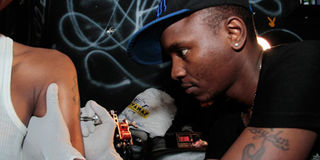Tattoo artists make their mark in Nakuru

Mr Francis Waweru working on a client at the Bat Cave Tattoo shop at Masters Plaza in Nakuru on October 8, 2014. Photo/Suleiman Mbatiah
What you need to know:
- We had to work for three more months to raise part of the seed money. We also sought our parents’ support for financial back up”
Mr Hans Joseph
Every day, Nakuru town is usually bustling with shoppers who are keen to snap up a bargain.
And now with a rising number of customers who have an insatiable appetite for trendy social lifestyles, this has opened a fresh opportunity. If you are thinking about getting a tattoo, you need to call Hans Joseph and Francis Waweru.
The two run a thriving tattoo parlour at the heart of the Rift Valley town. Their studio, Bat Cave Tattoo, is earning them a tidy sum of money.
“When we started, we could attend to three customers a week but now we attend to an average of six in a day,” says Mr Joseph who is pursuing a degree in purchasing and supply management at the Jomo Kenyatta University of Science and Technology.
After sharpening their tattoo art skills in Nairobi for a while, the two entrepreneurs in their early twenties, opened Bat Cave Tattoo parlour, in August 2013.
For them Nakuru had been a regular source of reliable customers.
“While in Nairobi, we served many customers coming from Nakuru. After a survey, we realised that despite the demand for the tattoo services, there were no professional parlours in the town,” says Mr Joseph.
For the 18 months they have been in business in Nakuru, the progress of the trade has been very promising.
On account of an increasing number of customers seeking their services alone, people in Nakuru are fast embracing tattoo art.
The increasing number of colleges and universities opening outlets in the cosmopolitan urban centre has been a good tiding for the two.
The schools provide a steady stream of customers to their shop.
In the past six years, there has been a growing number of universities setting up satellite campuses in the fourth largest town in Kenya. This has been a huge boost to the growth of Bat Cave Tattoo parlour.
Until late 1990s Egerton University and Kabarak University were the only higher education institutions in the town.
But that has changed significantly. Seven more universities have so far opened branches in the town and over 25 constituent colleges have opened doors in the town.
Customers part with a minimum of Sh2,000 for their tattoo services compared to Sh3,500 charged for similar services in Nairobi.
“But a customer can pay up to Sh250,000 or even more depending on the design and size of the tattoo. It all depends on the hours you spend on the individual. The more time you take on him or her, the higher the charges,” says Mr Waweru, a bachelor of commerce graduate from Egerton University.
The duo are professionally trained as tattoo artists and plans are underway to expand their enterprise to Kisumu, Nyeri and Eldoret by 2016.
Even as they now enjoy an encouraging customer base, starting off never came easy.
Together, they raised Sh500,000 that was used to import their tools of trade, acquire licenses and rent space.
They raised the money by working with their friends for five years in Nairobi while sharpening their skills. However, the amount was not enough, indeed, it was less than half of what they required to launch the startup.
As a result, the pair was forced to postpone the opening of their parlor from April to August, a window that allowed them to scout for more funds.
“We had to work for three more months to raise part of the seed money. We also sought our parents’ support for financial back up, which they agreed,” says Mr Joseph.
To grow their customer base, the two advertise themselves through door to door marketing. They also partner with learning institutions during talent shows.
“Doing door-to-door visits and being part of the organisers in students’ events is our key strategy in creating awareness of our existence among them considering that students are our primary customer base,” says Mr Waweru, adding “We also do local advertisements through brochures,” he adds.
Satisfying their customers’ needs makes part of their strategy in boosting referrals.
To be a professional tattoo artist, they say, it requires training for a minimum of six months.
The two say delay in arrival of tattooing tools and equipment from China and the United Kingdom sometimes affects their business since they are temporary put out of service.
They also recognise start-up capital as a major hindrance to young entrepreneurs who want to commercialise their business ideas.
“Not all youths want to be in groups to access Uwezo Fund or the Youth Enterprise Fund. I wish there was a way youths would individually access loans without the security demanded by banks and which they do not even have,” says Mr Waweru.





